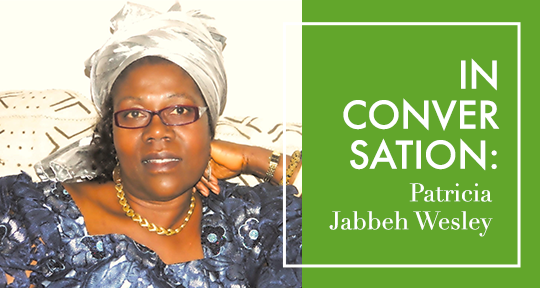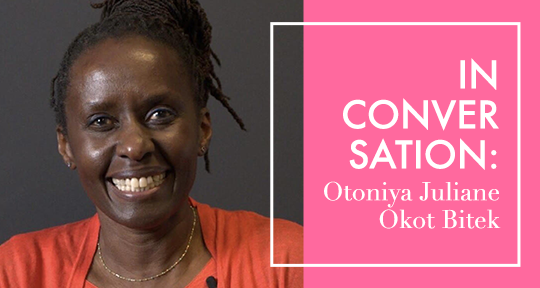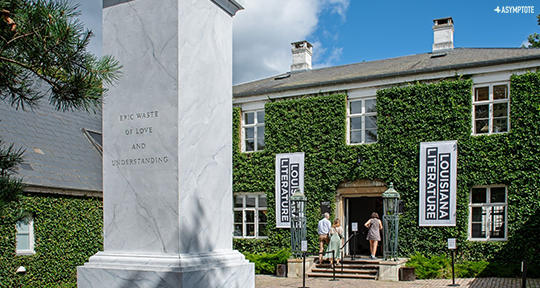Named by The Cambridge Companion to Postcolonial Poetry (2017) as “the first major poet to emerge from Liberia in decades,” Dr Patricia Jabbeh Wesley was born in her mother’s hometown of Dolokeh, Maryland County, southeastern Liberia, and raised in Monrovia, the capital city of Liberia. She then emigrated from there to the United States with her family during the First Liberian Civil War (1989-1997). With six critically-acclaimed poetry collections under her belt, Nigerian historian Ayodeji Olukoju has called her “a rising Liberian female literary star who has made a mark as a poet of note”, and she has been named Chee Dawanyeno by her people, the Grebo. Dr Patricia believes in the poetic moral imperative to bear witness on the brutalities—such as war, settler-colonialism, carnage, and genocide—perpetrated by those with structural power against the common people. In the words of Zimbabwean poet Tsitsi Jaji, from her panegyric “Praise Song for Patricia Jabbeh Wesley”: “But you look death in the eye and it looks down.”
In this interview, I spoke with Dr Patricia, recently proclaimed the Republic of Liberia’s inaugural Poet Laureate, on Liberian poetry as literature of witness and its poetic topography de nos jours; the presence of African orality and indigenous storytelling in Anglophone African writings; and the anthology she edited from the University of Nebraska Press, Breaking the Silence: Anthology of Liberian Poetry.
Alton Melvar M Dapanas (AMMD): As a survivor to the First Liberian Civil War, your activism involves documentation of and fact-finding on Liberian women’s stories of trauma as well as speaking your truth as an expert witness (such as during the Liberian Truth and Reconciliation Hearings in Minnesota in 2008 as commissioned by The Advocates of Human Rights). You once spoke of enshrining the war through words and of literature as testimony. Is that, for you, the role of the poet in times of lawlessness and monstrosities—a witness?
Patricia Jabbeh Wesley (PJW): Yes. I believe that the role of an artist and poet is to be the town crier of her people, the voice of the voiceless, the preserver of tradition and history of her people’s sensibility. In our African tradition, the artist belongs to the people, to the community, to the village, and to the clan. As a survivor of the brutal Liberian civil war, I must keep alive our families, friends, and all the people who were silenced in the fourteen-year-long series of civil wars. I have always used my poetry and writing as a tool for activism. One of our mother authors, the late Ama Ata Aidoo of Ghana once said, rightly, that, “For us Africans, literature must serve a purpose: to expose, embarrass, and fight corruption and authoritarianism. It is understandable why the African artist is utilitarian.”
AMMD: In Breaking the Silence: Anthology of Liberian Poetry (University of Nebraska Press, 2023), you historicised Liberian poetry, finding its roots as early as the 1800s in the time of statesmen Hilary Teage and Daniel Bashiel Warner—the anthology’s impetus being that “the silence [of Liberian literature at the global level] was deafening.” Can you speak more about this silence and how this anthology is speaking against it?
PJW: The anthology does not speak against the silence, though. It ends the silence. Liberian literature, art, and culture have been suppressed since the country’s founding. The founding fathers who were freed slaves from the South of America built a country fashioned after their former slave masters, where those who had always owned, lived on, and tended to the land were made the subordinates and those from outside were the lone leaders. They relegated the Africans who owned the land at the country’s establishment to a near second-class citizenship, not allowing indigenous Africans in what is now our country to help determine the direction of our country. That lasted for one hundred and thirty-nine years until the first military coup in 1980. The only other time an indigenous African was anywhere near the top of the country’s leadership was when Himie-Too Wesley, or H. Too Wesley, my husband’s great uncle, was made the Vice President in 1924 when the League of Nations charged the Liberian leadership with the enslavement of Krus and Grebo people, H. T. Wesley’s ethnic group. And for historical context, the newcomers, or Americo-Liberians, the freed slaves who founded the nation, were a very tiny minority, ruling the nation for 139 years while indigenous Africans were the huge majority and continue to be today. READ MORE…






